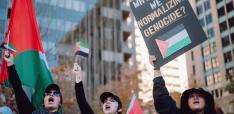Syria, a Call to Arms
Contrary to belief, the Arab Spring has not sprung. Many countries across MENA and elsewhere have and will continue to have revolutions to shed the chains of their authoritarian past. Syria remains the longest fraught struggle for democracy. In the past months the world has quietly waited for the Assad regime to give up power and allow for a populist regime change. After the NATO support for Libya and the international communities efforts to force Mubarak to step down, the next logical step would be for the international community to buttress efforts against the authoritarian Assad regime. After months of negotiations, UN Security Council geo-politics, hope is now a possibility for Syria’s Spring.
The UN Security Council’s decision did not come easily. Remnants of Cold War ties have made Russia unwilling to accept an aggressive UN intervention. Similarly, China has supported an Assad constitutional change through various attempts at back-door diplomacy, allowing for a progressive change, while stalling any interventions as a call against state sovereignty—striking a blow against a long-time ally. What passed last week was a watered down idea on how to intervene. Russia has vetoed past resolutions proposed by both the Arab League and Western powers. Meanwhile, Putin’s government has continued to provide an estimated 72% of total arms imports to the Assad regime.
What has happened in Syria has been called a human rights crisis. Armed violence against civilians and the use of heavy weapons in population centres have caused severe anguish for Syrians. While Kofi Annan’s proposal would facilitate humanitarian assistance and advance a Syrian-led transition, it may be too little too late. The resolution was in no way a major international effort as was seen in Libya, however it was and is an opportunity for the Security Council to approach this conflict unified rather than fragmented.
What has and will happen in Syria will have far reaching global and regional repercussions. The longevity of turmoil has caused increased insecurities for Syrian neighbors while simultaneously fueling what is becoming the second year of the Arab Spring. Additionally, the Syrian conflict has shown the dis-unity of the UN Security Council and the power of rivalries and ties. Great Power Politics reflects former ties to old regimes in the region and the desire to maintain influence in an ever-changing political landscape.
The Arab Spring has had a similar effect on the Arab World as the American War for Independence did on European nations suffering from monarchial repressions. Emerging nations like the US relied on French and Spanish military support to overthrow a repressive regime and to take out a major player from the ‘New World.’ Conversely, France and Haiti relied on support from the US for their political transitions. Supporting democracy through military support is a necessary trail on the road to democracy. If there is one thing we can learn from Syria and our past, it’s that Great Power Politics will have an ever-increasing role to play in the ongoing Spring, just as it did for revolutions in the Enlightenment. After recent violent events in Mali, when will the ripples of the Arab Spring calm, or will they ever?
